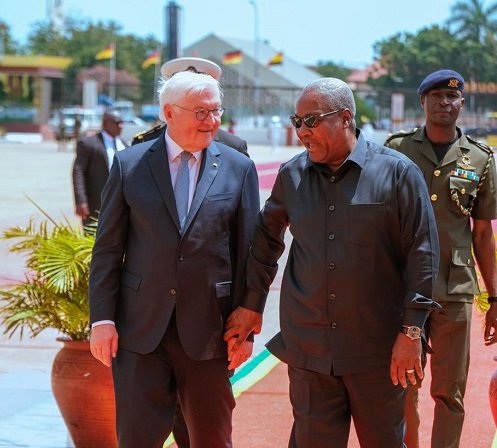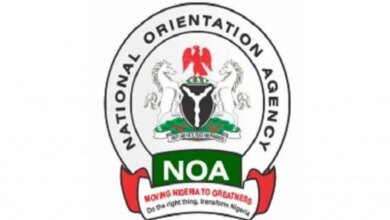Germany Pledges €65m Support to Ghana

Subject to the approval of the German Bundestag, the Lower House of the German Federal Parliament, Germany will support Ghana this year with more than €65 million, equivalent to over GH¢823 million, in development cooperation, President of the German Federation, Frank-Walter Steinmeier, has announced.
Details of the facility would be negotiated and finalised later this month, President Steinmeier announced in Accra yesterday during a joint press conference with President Mahama at the Presidency.
Mr. Steinmeier, who’s on a three-day state visit to Ghana, indicated that Germany sees Ghana as an important trading partner for the European country in Sub-Saharan Africa — one of the world’s fastest-growing regions.

“That is why I invited representatives of major German companies to accompany me on this trip to Ghana. The members of this business delegation include specialists in infrastructure development and construction, as well as in high technology — from satellite to medical engineering and much more,” he explained.
“I can assure you, as I heard from the delegation during our flight here that, Ghana is already an attractive business location and an important hub for the region — a gateway from which neighbouring markets can also be served,” he added.
Ghana, Mr. Steinmeier emphasised, offers many advantages not found everywhere in Africa: a well-educated population, English as the working language, and very little time difference with Europe; making the country ideal for investment.
Apart from investments, President Steinmeier said Germany was actively involved in training the younger generation to help them find good jobs, for instance in the health sector, pharmaceutical industry, and the digital economy.
According to him, it was crucial to create opportunities for Ghana’s rapidly growing young population, saying:
“I am very much looking forward to meeting with startup founders who wish to share their innovative ideas and services with German companies.”
He stated that the Ghana-Germany partnership goes beyond economics and extends to science and research, areas which are central elements of bilateral relations Germany intends to deepen.
On his part, President John Dramani Mahama noted that the discussions also touched on sustainability, decent employment, gender equality, climate resilience, and peace and security.

To this end, he said they’ve identified specific opportunities for stronger collaboration in renewable energy, green industrialisation, digital transformation, and skills development.
“These sectors are crucial to Ghana’s future and they align with global sustainability objectives. I especially welcome the ongoing productive cooperation between Ghana’s Ministry of Labour, Jobs and Employment, and several leading German companies to strengthen technical and vocational education and training for our young people,” President Mahama stated.
He reaffirmed Ghana’s strong dedication to creating an enabling environment to attract more German private sector investments, particularly within the framework of the African Continental Free Trade Area (AfCFTA) headquartered in Accra.
Ghana, President Mahama emphasised, was deeply concerned about recent actions that jeopardise the rule-based international order, especially the global trade system that has supported decades of prosperity and development around the world.
The dismantling of these established multilateral frameworks and the rise of unilateral protectionism, he noted, threaten to plunge the world into economic instability, greater inequality, and conflict.
He invited Germany to share Ghana’s strong commitment to multilateralism, the United Nations system, the World Trade Organisation (WTO), and international law, urging all nations to resist the lure of economic nationalism and instead collaborate in reforming, not dismantling, the institutions that unite us as a globe.
“In President Steinmeier, Ghana has found not just a partner but a friend who recognises that Africa’s development is crucial to global peace and prosperity and that genuine partnership must be based on equality, mutual respect, and shared benefits,” he stated.
BY JULIUS YAO PETETSI




